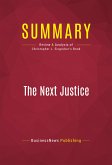Master's Thesis from the year 2004 in the subject Politics - Region: Near East, Near Orient, grade: 1,0, University of London (School of Oriental and African Studies), course: Political Systems of the Modern Middle East (SOAS), language: English, abstract: This dissertation discusses the role of the Israeli High Court of Justice within the political system of Israel after the enactment of two Basic Laws in 1992. The main thesis is that the power of the court has been much overestimated. In particular, the large assumptions connected to the 'constitutional revolution' that many saw in the enactment of the 1992 laws must be refuted. This paper argues that the alleged 'revolution' was a myth, and that fundamentally nothing much has changed. The political system largely remained untouched by the 1992 laws. This dissertation defines the role of the court as a mediator between particularistic and universal values rather than promoting universal human rights, or protecting minority rights. In fact, the role of the High Court must be regarded as stabilizing an essentially undemocratic system by legitimising government policies and by supporting a discourse that maintains the democratic façade of the system. The enactment of a constitution has not been promoted by Chief Justice Barak's activism, and indeed has made the enactment of a constitution much less likely.
Dieser Download kann aus rechtlichen Gründen nur mit Rechnungsadresse in A, B, BG, CY, CZ, D, DK, EW, E, FIN, F, GR, HR, H, IRL, I, LT, L, LR, M, NL, PL, P, R, S, SLO, SK ausgeliefert werden.









